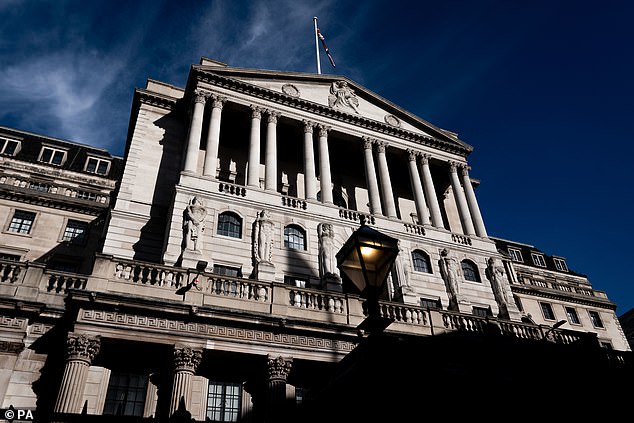The Bank of England never misses an opportunity to miss an opportunity. Its latest minutes clearly show that after an unexpectedly firm start to the year, the British economy has descended into gloom.
Labour’s £40billion of tax increases are taking a real toll on jobs and output.
The Government’s core growth mission is failing. The Bank expects output to be barely up in the second quarter, by 0.25 per cent.
Recent surveys suggest growth is grinding along at near to zero. Special factors, such as Trump tariff mayhem, may be part of that. But it is impossible to ignore warnings from
business leaders including James Dyson and John Roberts of online retailer AO World, who are blaming tax and anti-wealth policies for the drudgery.
Further evidence that confidence is evaporating comes from Whitbread, owner of Britain’s largest hotelier Premier Inn.

Slump: The latest minutes from the Bank of England clearly show that after an unexpectedly firm start to the year, the British economy has descended into gloom
It cited rising employment costs and economic headwinds as factors in the 2 per cent drop in sales in the quarter which ended on May 29.
All this should have encouraged the Bank to move ahead of the curve.
Instead, six members of the Bank of England’s interest rate committee sat on their hands and held the key borrowing rate at 4.25 per cent.
There was one glimmer of light with Bank insider Dave Ramsden, joined by two outside members, the dove-ish LSE professor Swati Dhingra and US-based economic guru Alan Taylor, who voted for a quarter-point cut.
The cautionary group on the Monetary Policy Committee argued that, with inflation at 3.4 per cent and likely to remain at 3.5 per cent for the rest of the year, dis-inflation needs to continue.
Yet two of the Bank of England’s most closely watched metrics – private sector earnings and prices for services – are heading downwards.
Monetary policy takes time to work, which is another reason for lowering rates. Higher-than-necessary borrowing costs constrain a housing market punished by stamp duty and restrain enterprises from borrowing for investment.
Conflict between Israel and Iran is also considered a reason for holding back.
The oil price already has zipped up and supplies, as former BP boss John Browne warns, could be dramatically reduced if the Strait of Hormuz were to be closed.
The classic textbook policy response to shocks and uncertainty is to ease credit conditions and prevent a flatlining economy plummeting into recession. After all, emergency rate cuts can be reversed.
The US Federal Reserve and the Bank may be on hold, but some central banks are bolder. Norway cut rates for the first time in five years yesterday.
The Swiss, facing a tide of inward funds looking for a safe home, cut rates to zero. There is even talk of negative rates.
The Old Lady has now descended into a pattern in which it chooses to ease rates in the months when it publishes its full monetary policy report.
That means waiting until August, when minds are on buckets and spades rather than buying and building homes, and borrowing to invest.
Science class
There is comfort to be drawn from the latest QS World University rankings which shows that the UK is up among the elite with four institutions – Imperial, Cambridge, Oxford and UCL – in the top ten.
But research standards are slipping, with 54 of the 90 British universities falling down the league table.
Improved funding and tax breaks would create a real opportunity for the UK to poach disaffected scientists and AI innovators alienated by Trumpian attacks on Harvard.
Instead, the Government is bogged down. A 104-page infrastructure plan is all but incomprehensible, with talk of ‘spatial tools’ and ‘granular modelling’.
I’ve a better idea: ramp up research spending and watch invention and enterprise bloom.
Slam dunk
Everything in America is bigger, including the valuation of sports franchises.
The LA Lakers basketball team is being snapped up by Mark Walter of TWG Global for $10billion (£7.4billion), making it the most valuable team on earth.
TWG has stakes in the LA Dodgers baseball team and women’s basketball outfit LA Sparks. That makes Premier League football teams look cheap.
DIY INVESTING PLATFORMS

AJ Bell

AJ Bell
Easy investing and ready-made portfolios

Hargreaves Lansdown

Hargreaves Lansdown
Free fund dealing and investment ideas

interactive investor

interactive investor
Flat-fee investing from £4.99 per month

InvestEngine

InvestEngine
Account and trading fee-free ETF investing

Trading 212

Trading 212
Free share dealing and no account fee
Affiliate links: If you take out a product This is Money may earn a commission. These deals are chosen by our editorial team, as we think they are worth highlighting. This does not affect our editorial independence.











